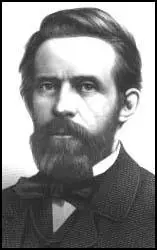George Boutwell

George Boutwell was born in Brookline, Massachusetts, on 28th January, 1818. He became a teacher in Shirley before being appointed postmaster of Groton.
A member of the Democratic Party, he studied law before being elected to the Massachusetts legislature in 1842. After eight years in the legislature he was the successful candidate for governor in 1850 and 1852. He then became secretary of the State board of education (1855-1861).
Boutwell played an active role in trying to prevent the outbreak of the American Civil War. He was elected to Congress as a member of the Republican Party in 1862 and in 1865 was chosen as chairman of the House of Representatives Committee that looked into the assassination of President Abraham Lincoln. Only Boutwell was allowed to look at all the relevant papers and afterwards the Democratic Party member of the committee, Andrew J. Rogers, accused him of being involved in an attempt to cover-up the role of Edwin M. Stanton in the handling of the case.
In 1867 Boutwell was one of the seven members chosen by the House of Representatives to prosecute its impeachment charges against President Andrew Johnson.
In 1869 Boutwell was appointed by President Ulysses S. Grant as his Secretary of the Treasury. He resined his post in 1873 and later that year was elected to the Senate. He served as chairman of the Committee on the Revision of the Laws of the United States. However in 1884 he declined the offer to become Secretary of the Treasury.
Boutwell wrote several books including his autobiography, Reminiscences of Sixty Years in Public Affairs (1902). George Boutwell, who was also president of the Anti-Imperialist League (1898-1905), died in Groton on 27th February, 1905.
Primary Sources
(1) George S. Boutwell, Abraham Lincoln: Tributes from His Associates (1895)
Hooker was in Washington on the Thursday of the week before the battle of Gettysburg, and at a conference with the President and the Secretary of War, it was agreed to hold Harper's Ferry, which, the year before, had been surrendered with great loss of men and materials of war. Upon his return to headquarters General Hooker changed his opinion, and, without reporting to the Secretary of War, he ordered General Wilson to evacuate the post and join the main army. The order Wilson transmitted to the Secretary of War. Mr. Stanton, assuming that there had been in error in the dispatches, or a misunderstanding, counter-manded Hooker's order. Thereupon Hooker, without seeking for an explanation, resigning his command.
(2) George S. Boutwell, Reminiscences of Sixty Years in Public Affairs (1902)
The preservation of the papers (refering to the involvement of Jefferson Davis and other members of the Confederate government being involved in the assassination of President Abraham Lincoln) may have been an error. They should have been destroyed by the committee. I am the only living person living who has knowledge of the papers. It is not in the public interest that the papers should become the possession of the public.
(3) Andrew J. Rogers, House of Representatives Report into the Assassination of President Abraham Lincoln (1865)
For some reason or reasons not fully stated, the majority of the committee determined to throw in my way every possible impediment. The papers were put away from me, locked in boxes, hidden; and when I asked to see them, I was told that I coould not. It was said the interests of the Government required that none should see these papers save and only Mr. Boutwell who was preparing the majority report. Secrecy has surrounded and shrouded, not to say protected every step of these examinations, and even in the committee-room I seemed to be acting with a sort of secret council of inquisition, itself directed by an absent vice-inquisitor, and grand inquisitor too.
(4) Andrew J. Rogers, the only Democratic Party member of the House of Representatives Committee that looked into the assassination of President Abraham Lincoln, issued his own minority report (1865)
I do not say that Judge Holt did himself originate the charges or organize the plot of the perjurers, because I do not know that he did; I merely say that a plot based on the assassination was formed against Davis, Clay, and others, and that the plotters did, and even yet, operate through the Bureau of Military Justice, and that the argument forwarded by Mr. Holt to the Committee of the Judiciary looked to me like a shield extended over the plotters may be, with a desire to save certain officers of the government from the charge of having been betrayed into the blunders of an excitement, which it was their province to allay or control, not to increase. I believe this was done to hide the disgraceful fact that the assassination of Mr. Lincoln was seized upon as a pretext to hatch charges against a number of historical personages, to blacken their private character, and afford excuse for their trial.
